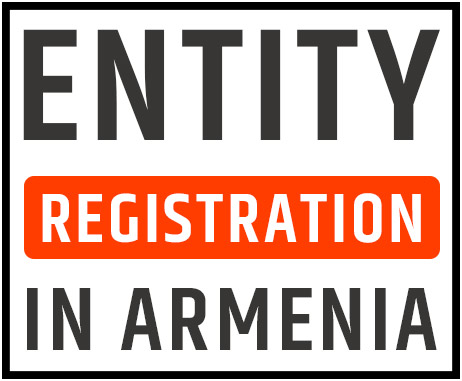Navigating Entity Registration in Armenia: Key 5 Points You Can't Miss

Registering a business can be overwhelming. There are so many points to cover, from choosing a location for your business to managing the step-by-step legal process for entity registration in Armenia.
Choosing Armenia for company registration has become a popular decision among foreign entrepreneurs due to the absence of nationality restrictions and minimum capital requirements. A residence permit isn’t necessary, either.
Here, we cover 5 important legal points related to setting up a successful business in Armenia.
Naming your business
To get state registration approval, you need to submit a business name that complies with legal requirements. The name must be unique and not already registered. It shouldn’t resemble other businesses known to the public to avoid confusion, and it must not go against the public interests, principles of humanity, and morality.
The usage of the words “Arm,” “Armenia,” and “Armenian” and their translations in the name requires a permit and an annual state fee of 600,000 AMD. Application forms need to be filled in Armenian. The founders of legal entities and authorized persons can make the requests.
After the Intellectual Property Office approves the name, it is recorded in the State Register of Legal Entities. In case of rejection, you’ll be able to submit another request without any payment.
Choosing the legal type of your business
There are different aspects to consider when deciding on the business structure of your entity: number of owners, tax burden, liability protection, paperwork, etc.
In Armenia, company registration is free of charge, whereas the registration fee for a sole entrepreneur is 3,000 AMD.
Here are the types of businesses to consider.
Limited Liability Company (LLC)
Small businesses often register as LLCs due to simple registration processes and limited personal liabilities related to the company’s debts and obligations.
In Armenia, both individuals and legal entities, residents and foreigners, can apply to register an LLC. The number of participants in a company may not exceed 49.
Founders/owners and the director need to submit their passports and ID cards. Foreign founders will need to provide notarized copies of their documents. At this point, it’s necessary to submit company details: the name, legal address, amount of invested capital, and the share of each founder.
The in-person process of submitting the documents to the relevant authority takes about 10-15 minutes, and the actual state registration of the company takes 1 business day.
Private Entrepreneurship
A person can register as a sole proprietor (individual entrepreneur) to do business in Armenia without forming a company. In this case, a single person owns and manages the business and is personally responsible for any liabilities. The registration process is fast and easy. Once registered, the person gets a tax ID.
Joint-Stock Company – Open and Closed
This is a form of organization where investors or shareholders with a common purpose provide financing to the company.
Open Joint-Stock Company (OJSC) is public, which means there is no limit on the number of shareholders. The entity is allowed to offer shares to the public through open subscriptions or the stock exchange.
A closed Joint-Stock Company (CJSC), on the other hand, is private, meaning company shares are not publicly listed. It can have no more than 49 shareholders.
A Joint Stock Company can also be set up by one person. In this case, the person would be the sole shareholder, owning all the shares of the company.
Business Partnership
A partnership can be managed by two or more stakeholders. There are two types: a full partnership and a limited partnership. Establishing a full partnership company means that partners act as co-owners of the company and have equal rights in business decisions. In the case of a limited partnership, one of the partners is a general partner and is in charge of management, while the other one is a limited partner who participates in meetings but cannot make decisions for the company.
Branches and Representative Offices
Many global companies have established operations in Armenia. Foreign companies have the option to open branches and representative offices within the country and conduct business on behalf of their parent entity. It’s important to note that these offices are not considered independent legal entities.
The difference between a branch and a representative office is that a branch may perform commercial activities, while a representative office has limited functions and can’t engage in profit-generating activities.
Paying Taxes
Tax relations in the Republic of Armenia are regulated by the unified tax system. Companies may be subject to different tax regulations based on their structure and operational specialties. There are special tax regimes, government assistance programs, and tax-free status benefits for small companies, IT startups, and companies operating in free economic zones.
Entities with a permanent establishment (PE) are liable for corporate income tax (CIT), and for tax residents, their worldwide income is taxable. The standard CIT (Corporate Tax Rate) is 18, and VAT (Value Added Tax) is 20%.
The tax system in Armenia is being reformed constantly to support businesses and ensure efficient economic growth.
Business Licensing
In Armenia, licensing activities are regulated by the Law on Licensing. Specific permits may be required for various sectors.
The list includes:
- healthcare
- banking and finance
- education
- security
- trade sector
- energy
Licenses can be issued through simple and compound procedures. A simple license shall be issued after three days upon submission of the application without the decision of the licensing commission.
A compound license shall be issued after 30 days upon the application submission based on the conclusions of licensing commissions.
Employment Լegislation
When hiring employees, it’s crucial to understand local employment laws. In Armenia, working relations are regulated by the Labor Code. The employer needs to provide staff members with a written statement of employment. When creating the contract, employers need to comply with labor legislation grounds, considering maximum working hours, national minimum wage, employee tax, health and safety policy, annual leave, employer liability insurance, etc. Contracts can be signed for a definite and indefinite period of time.
Foreign citizens in Armenia work under similar regulations on receipt of relevant visas and permits.

Other points to consider when registering an entity in Armenia
Business planning is a complex process with many points to cover. Apart from what we mentioned in this article, it’s important to consider other aspects, such as opening a bank account, choosing a legal address, registering trademarks, and evaluating potential changes to the corporate structure for each business case.
Specialists at Tower are ready to help you register a business in Armenia and comply with legal requirements in Armenia. Contact us to learn more about our consulting services. Contact our legal and accounting specialists for more information and our services.


